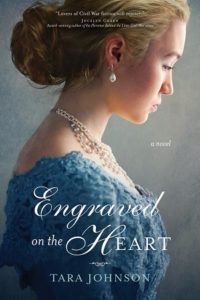Tara Johnson’s debut novel, Engraved on the Heart (Tyndale House), brings Savannah, Ga., during the Civil War to life: Reluctant debutante Keziah Montgomery lives beneath the weighty expectations of her staunch Confederate family. Dr. Micah Greyson never hesitates to answer the call of duty, no matter how dangerous. Together, Keziah and Micah must decide if they are strong enough to survive the unyielding pain of war. In this interview, the author shares how she drew on her own struggles to write the main character, what drew her to set the novel during the Civil War, and how God works through our frailties…
What inspired you to write Engraved on the Heart?
 The spark of the idea for Engraved on the Heart began when our family visited Savannah, Georgia several years ago. I was entranced with the history and charm of the town. Secrets seemed to ooze out of every corner.
The spark of the idea for Engraved on the Heart began when our family visited Savannah, Georgia several years ago. I was entranced with the history and charm of the town. Secrets seemed to ooze out of every corner.
My family opted to take a historic riding tour of the city. I was especially intrigued by a fact rattled off by our tour guide: “Many of the older homes and buildings in and around the outskirts of Savannah were built by slaves. In fact, if you look closely, you can find some of their fingerprints in the bricks.”
Later that day as I passed a home, a darkened impression molded into the crumbling brick snagged my attention. I sucked in a surprised breath over the precious detail. There it was, staring back at me. The fingerprint of a slave. I ran my finger over the scarred impression, marveling that such a small mark could tell such an exquisite story.
I wondered whose hands had formed the old brick. What was his name? What were his dreams? Running my fingers over that precious print linked me inextricably to the past, binding an invisible cord between the nameless slave and me.
The next day, we visited the Georgia State Railroad Museum where I found several books in the gift shop about famous women of the Civil War. Courageous heroes like Elizabeth Van Lew who fought against the norms of her culture to give freedom and hope to those trapped in darkness. I devoured their stories, many of whom I’d never heard of in school or otherwise. From there, God slowly unfurled a story in my heart.
Tell us about some of the core themes that are explored in your novel. How can your readers relate to these areas in their own lives?
Keziah’s struggle to realize her worth, especially in light of her physical disabilities, provide the foundation for this story. Because of the shame her parents heap on her due to her epilepsy, Keziah battles against a common lie many of us have fallen for as well—that approval and love are the same thing. These two concepts are polar opposites. It isn’t until Keziah and Micah are thrust into choosing society’s approval versus their own personal convictions that they truly understand the difference between the two.
Just like the characters in Engraved in the Heart, readers will see the beauty within their own broken places, and that our worth is not dependent on our accomplishments or failures, but rests in the unconditional love of Christ.
Your heroine, Keziah, battles epilepsy. Where did you draw on the inspiration for her struggle?
 I grew up with epilepsy and understand all too well how frustrating such a condition can be. It was far worse in the 1800s, when epilepsy was so misunderstood. Many people who battled this condition were placed in asylums.
I grew up with epilepsy and understand all too well how frustrating such a condition can be. It was far worse in the 1800s, when epilepsy was so misunderstood. Many people who battled this condition were placed in asylums.
Although my own family was extremely supportive, I remember the shame that accompanied those moments in elementary school when I would find two dozen pairs of eyes staring at me in horror because I had a seizure. I remember how frustrating it was to find a chunk of time missing from my memory, yawning like a black hole.
And I remember the helplessness of having no control over my own body. As Keziah’s character developed, I thought the dichotomy between Underground Railroad conductor and epilepsy patient would be extremely interesting to explore.
In my research, I learned Harriet Tubman also battled epilepsy. To think of someone leading fugitives to freedom, when their own body was enslaved to a certain degree, was a fascinating, and terrifying, prospect.
Have you always loved learning about the Civil War? What is it about this era that draws you?
Growing up, my Mom and I enjoyed our yearly tradition of watching Gone with the Wind together. I have loved learning about the Civil War ever since.
When I was young, the drama and potential romance of the period drew me in, but as I’ve gotten older, I’ve fallen in love with the stories of heroism from brave men and women on both sides of the conflict. The Civil War was a turning point for our nation on so many levels—politically, socially, emotionally—not to mention the amazing inventions and reformations that occurred as a result. It completely changed the landscape of our society.
If you had to choose one Bible verse as a theme for Engraved on the Heart, which one would it be, and why?
I would say 2 Corinthians 12:9 is the heart of this story. “And he said unto me, My grace is sufficient for thee: for my strength is made perfect in weakness. Most gladly therefore will I rather glory in my infirmities, that the power of Christ may rest upon me.”
We may think our strength enables us to do great things for God, but the opposite is true: It’s the power of a great God working through our frailties that will change the world.
Visit Tara Johnson’s author page:
https://www.familyfiction.com/authors/tara-johnson
Engraved on the Heart
Tara Johnson
Tyndale House


